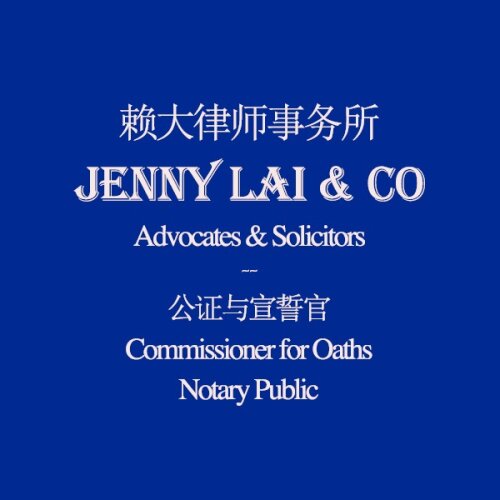Best Real Estate Due Diligence Lawyers in Singapore
Share your needs with us, get contacted by law firms.
Free. Takes 2 min.
Free Guide to Hiring a Real Estate Lawyer
Or refine your search by selecting a city:
List of the best lawyers in Singapore
About Real Estate Due Diligence Law in Singapore
Real Estate Due Diligence in Singapore involves the comprehensive and meticulous examination of all aspects of a property before its acquisition. This process seeks to uncover any potential risks or issues associated with the property, such as legal defects, financial liabilities, zoning restrictions, or environmental concerns. Conducting due diligence ensures that buyers make informed decisions and can plan appropriately for future developments. In the thriving property market of Singapore, due diligence is paramount to ensuring a transaction is both legally and financially sound.
Why You May Need a Lawyer
There are several situations in which seeking legal advice on Real Estate Due Diligence in Singapore is beneficial:
- Complex Transactions: When dealing with commercial properties or multi-unit developments, the due diligence process becomes more complex, necessitating legal expertise.
- Identifying Legal Issues: A lawyer can identify and help resolve legal issues such as unclear title deeds, outstanding liens, or easements on the property.
- Contract Negotiation: Lawyers can assist in negotiating terms and conditions that protect a buyer’s interests in a Sale and Purchase Agreement.
- Risk Mitigation: Legal advisors help in assessing and mitigating risks associated with property transactions, ensuring long-term security for the buyer.
- Regulatory Compliance: A lawyer can ensure compliance with local laws and regulations, including lease agreements, land use, and building codes.
Local Laws Overview
Understanding local laws is crucial for effective Real Estate Due Diligence in Singapore. Some key aspects include:
- Land Titles System: Singapore operates under the Torrens system, whereby the Singapore Land Authority maintains a register of titles to streamline ownership verification.
- Option to Purchase: This legal document grants an exclusive right to purchase the property, typically involving a non-refundable deposit.
- Contractual Obligations: The Sale and Purchase Agreement outlines the contractual obligations of both parties, highlighting the importance of due diligence fulfillment before signing.
- HDB Regulations: Purchasing Housing Development Board (HDB) flats involves adherence to specific eligibility requirements and resale procedures.
- Foreign Ownership Restrictions: Certain restrictions and approval processes exist for foreign entities desiring to own certain types of properties in Singapore.
Frequently Asked Questions
What is real estate due diligence?
Real estate due diligence involves examining pertinent aspects of a property to uncover potential risks or issues before completing a purchase.
What documents are essential during due diligence?
Key documents include the title deed, land sale contract, zoning certificates, building plan approvals, and tenancy agreements.
How long does the due diligence process take in Singapore?
The due diligence process duration varies significantly, generally taking between 30 to 90 days depending on the complexity of the transaction.
What are potential risks if due diligence is not conducted?
Risks include purchasing properties with title disputes, hidden defects, zoning restrictions, or significant financial liabilities.
How can a lawyer assist in due diligence?
A lawyer verifies title clearances, uncovers potential liens, negotiates contractual terms, and ensures adherence to local laws.
Are there restrictions on foreign property ownership in Singapore?
Yes, foreigners face restrictions on owning certain properties, particularly land plots and landed properties, without government approval.
What should I verify about zoning laws?
Verify zoning laws to ensure that the intended use of the property complies with local land use regulations and development plans.
What is the role of a title search?
A title search confirms legal ownership and identifies any claims, liens, or encumbrances against the property.
Can I purchase an HDB flat as a non-Singaporean?
Generally, only Singapore citizens and permanent residents are eligible to purchase HDB flats, with additional eligibility conditions.
What are the tax implications of purchasing real estate in Singapore?
Buyers are subject to various taxes, including the Buyer’s Stamp Duty and Additional Buyer’s Stamp Duty, which vary based on residency status and property type.
Additional Resources
To aid your real estate due diligence process, consider these resources and organizations:
- Singapore Land Authority (SLA): Responsible for land title registration and management.
- Urban Redevelopment Authority (URA): Offers insights on zoning and land use planning.
- Housing & Development Board (HDB): Provides guidelines for purchasing HDB flats and eligibility criteria.
- Council for Estate Agencies (CEA): Regulates real estate agency practices and offers consumer advice.
- Law Society of Singapore: Provides a directory of practicing lawyers and insights on hiring legal counsel.
Next Steps
If you require legal assistance in Real Estate Due Diligence, follow these steps:
- Identify your specific needs and issues in relation to the property you are interested in.
- Seek recommendations or use the Law Society of Singapore to find a lawyer specializing in real estate law.
- Consult with a lawyer to discuss your case and understand applicable legal fees and processes.
- Gather all necessary documentation and information related to the property.
- Collaboratively work with your lawyer to conduct thorough due diligence and address any discovered issues.
Lawzana helps you find the best lawyers and law firms in Singapore through a curated and pre-screened list of qualified legal professionals. Our platform offers rankings and detailed profiles of attorneys and law firms, allowing you to compare based on practice areas, including Real Estate Due Diligence, experience, and client feedback.
Each profile includes a description of the firm's areas of practice, client reviews, team members and partners, year of establishment, spoken languages, office locations, contact information, social media presence, and any published articles or resources. Most firms on our platform speak English and are experienced in both local and international legal matters.
Get a quote from top-rated law firms in Singapore — quickly, securely, and without unnecessary hassle.
Disclaimer:
The information provided on this page is for general informational purposes only and does not constitute legal advice. While we strive to ensure the accuracy and relevance of the content, legal information may change over time, and interpretations of the law can vary. You should always consult with a qualified legal professional for advice specific to your situation.
We disclaim all liability for actions taken or not taken based on the content of this page. If you believe any information is incorrect or outdated, please contact us, and we will review and update it where appropriate.
Browse real estate due diligence law firms by city in Singapore
Refine your search by selecting a city.














